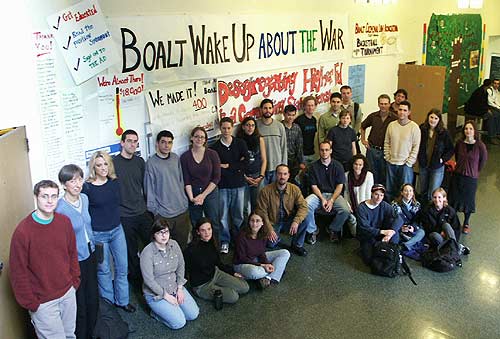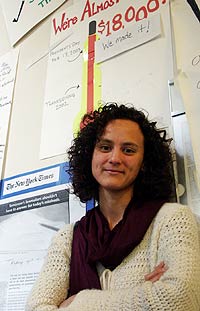 Some of the Boalt Hall students involved in the Wake Up About the War movement pose beneath posters detailing their actions. (BAP photos) |
Law students raise $18,000 to publish anti-war protest
BERKELEY - Beginning last semester, some of the 900-plus students at UC Berkeley's School of Law were having a hard time with their classes. It wasn't academic pressure, but what they perceived as the vast chasm between the principles being taught in their constitutional, civil rights, and international law courses and the actions of the U.S. government.
"There was a total disconnect between what we were learning in the classroom and what was coming out of Attorney General John Ashcroft's office and other Washington, D.C. agencies," says Abby Reyes, a second-year Boalt Hall student. "We were quite alarmed, and we started thinking about how many other law students across the nation might be feeling this way."
They were also frustrated by the lack of discussion around these legal issues, which "came as a shock to me, given UC Berkeley's history," says Mohammad Walizadeh, also a second-year Berkeley law student. "Teachers weren't bringing it up, students weren't talking about it."
 'There was a total disconnect between what we were learning in the classroom and what was coming out of Attorney General John Ashcroft's office and other Washington, D.C. agencies.' -Abby Reyes, law student and
co-organizer, Wake Up About the War |
With the support of some of their professors, Reyes, Walizadeh, and about 40 other Berkeley law students began researching three main areas of concern: separation of powers, abrogation of civil rights, and the violation of international law obligations. Once they came to the conclusion that specific government actions - among them the establishment of military tribunals, detainment of immigrants without formal charges, and the U.S. Patriot Act - violated the very laws they were studying, they began e-mailing and calling friends at seven other California law schools in what grew into the Wake Up About the War movement.
The idea was to put their money where their mouth was - and buy a bullhorn to proclaim their point of view. Through a combination of teach-ins, house parties, invited speakers, student-to-student communication, and even a showing of the movie "Doctor Strangelove," the students spread word about their findings and began raising funds. As of this week, the students had raised $18,000 - just enough to meet their goal of placing a full-page advertisement in the New York Times.
"We wanted to let the public know that not all lawyers are like the attorney general, and that the up-and-coming generation of legal minds is appalled at what's gong on," explains Reyes. "We take seriously our responsibility to work for justice and peace and to create sustainable societies and communities within those societies. That work is really being undermined by some of the legislation and executive acts coming out of Washington, and this generation simply doesn't have time for that."
Titled "Tomorrow's Lawmakers Shouldn't Have to Answer for Today's Misdeeds," the ad was scheduled to run in today's western edition of the New York Times but was bumped by the newspaper to tomorrow. More than 300 students from law schools at Stanford, UC Davis, University of San Diego, Golden Gate University, and others contributed at least $25 each to add their names to the ad's petition. The remainder of the cost was anted up by sympathetic faculty and staff as well as "our supervising attorneys, by anyone in our communities-our parents, our siblings, neighbors, even our landlords," says Reyes.
The fund-raising itself began stimulating more debate on campus. "Every time we had to ask someone for money, it would start a discussion," says Walizadeh. "I learned the most from people who stopped by our table to tell us they didn't agree with us. But even many of the people who didn't sign the petition are excited for us, because we took a problem and turned it into a tangible action with this ad."
The ad (left) depicts a simulated copy of a contemporary legal history exam, on which the "essay" question is posed, "What became of civil liberties and international law obligations under the administration of George W. Bush?" The answer, scrawled in pencil, reads, "They got in the way." The students then "call on the Bush administration to stop compromising our generation's ability to pass that test" - the test being to foster just and peaceful societies - and directs readers to a Web site (www.wakeupaboutthewar.org), which contains their platform summarizing their research.
Lucas Guttentag, director of the Immigrants Rights Project for the American Civil Liberties Union, lectures at UC Berkeley's Boalt Hall on the civil and constitutional rights of immigrants. He was invited by the Wake Up About the War students to give a talk and to advise them on some of their research. "I heard both from the students in my class and from others that there is a profound and deep-seated concern over what the Bush administration is doing in the name of the war on terrorism to the rule of law and equal treatment to individuals in our society. That's what's reflected in this ad," Guttentag says. "The time and effort that went into writing the ad, raising the money, and collecting signatures from across the state demonstrates an enormous level of concern, especially given the considerable academic pressure these students are under at the same time."
Marjorie Cohn, professor of law at the Thomas Jefferson School of Law in San Diego and executive vice president of the National Lawyers Guild, echoes Guttentag. "The abrogation of civil liberties comes up in every class I teach - in my criminal procedures class, when we talk about the balance between liberty and security; in my international human rights class, when we talk about the necessity of work through the United Nations and within the scope of international law," she says. Cohn also became an adviser to the Thomas Jefferson branch of Wake Up, which like the Boalt Hall students has been organizing teach-ins and even a human-rights symposium.
The Berkeley group represents a broad cross-section of Boalt Hall, including "teachers, mothers, even grandmothers," says Reyes. "Many of the active students are not coming from an activist background." Reyes herself is: in 1999 her boyfriend Terence Freitas, age 25, was one of three human-rights workers kidnapped and murdered while assisting an indigenous community in oil-rich northeastern Colombia. The experience galvanized her. For Walizadeh, an Iranian raised in Los Angeles, the motivation is more general. "My parents have always told me to keep my head up high and speak my mind," he explains.
The New York Times ad may have achieved the law students' goals, but their plans don't stop there. They've prepared a letter-writing campaign directed at every member of the House and Senate, asking them to uphold the legal principles with which they were sworn into office and offering the students' support as the lawmakers struggle to stand up for what they believe in.
And there will be more initiatives. "We now have this network of more than 300 students from eight different law schools who know how to work together and how to support each other," says Reyes. "The momentum is really building. California law students will continue, we hope, to have a voice in this national debate."

